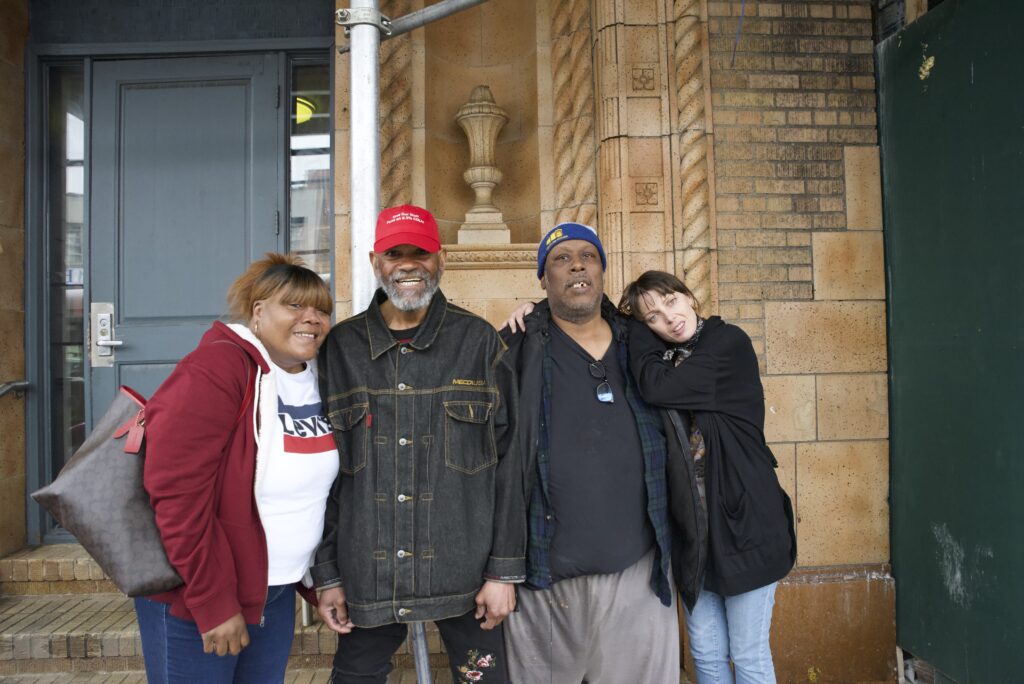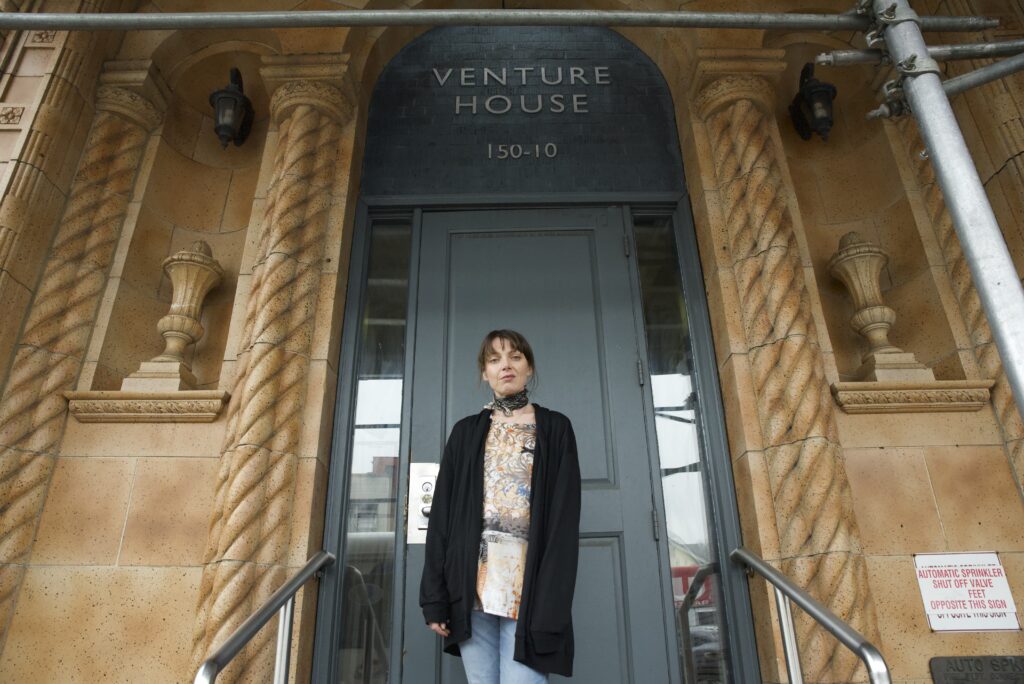
Members Sarah, Dave, Richard and Janet outside of the clubhouse.
By Iryna Shkurhan | ishkurhan@queensledger.com
Venture House stands unassuming on Hillside Ave in Jamaica, Queens with its yellow brick exterior and arched windows.
To a passerby, there’s not enough to guess that a vibrant community, known as a clubhouse, dedicated to helping people with serious mental illness (SMI) find their place in society exists on the other side of the lofty teal door.
Unlike other mental health service providers structured around a hierarchical model that puts psychiatrists at the top and patients all the way on the bottom, Venture House aims to give its members autonomy without skimping on support and resources. Members are heavily involved in the day-to-day operations of the clubhouse, while also countering the isolation that can come with their diagnosis through friendship.
“We are not in the business of turning people away,” said David Plotka, the Program Director at the Queens location. Anyone over the age of eighteen diagnosed with a SMI — bipolar disorder, schizophrenia and severe depression — living in the five boroughs is welcome to become a member for life.
Earlier this month, Mayor Eric Adams unveiled a mental health agenda that plans to invest $20 million in the expansion of mental health services such as overdose prevention and serious mental illness support. One key proponent of his plan is to expand clubhouse capacity across five boroughs. Currently there are 14 locations across the city and four in Queens. Venture House also has a second location in Staten Island.
The clubhouse model of psychosocial rehabilitation first sprouted in 1943 by a group of New Yorkers who were discharged from a psychiatric facility but wanted to sustain the mutual support they found in each other. In 1948, the first clubhouse, Fountain House, was opened in Manhattan and is still supporting members today. There are 320 clubhouses around the world in 30 countries that are accredited by Clubhouse International.
One study found that eighty percent of people with mental illness are unemployed, despite around sixty percent wanting to work, according to the National Alliance on Mental Illness. Employment rates also decrease with an increase in the severity of the mental illness.
Since day one, Venture House’s employment strategy has focused on transitional employment — a part-time temporary work placement that lasts approximately six to nine months. For those with a checkered employment history or blank resume due to their psychiatric history, completing a temporary placement evokes a sense of accomplishment, without the pressure of holding it down forever.
“It’s a little bit of a reframe, if you will. It’s not that you left a job, or maybe you couldn’t sustain the job after a year or nine months, it’s more like, congratulations, you finished the placement and that’s reason to celebrate,” said Plotka. “We want people to feel a sense of success and then maybe they’re looking for more permanent employment.”

Members attended a work readiness group where they discussed how to deal with issues that arise in the workplace.
Members are currently employed at UBS Arena, Citi Field, West End Tennis Club at Forest Hills, and Turn the Page bookstore in Bayside, among others. Earlier this month, Venture House also partnered with RDS, a courier service based in Long Island City, for more transitional employment positions for their members.
“I had extensive work history and education. However, when you have a gap of ten years, it’s intimidating, and it’s embarrassing, there’s a lot of shame,” said Janet Perisa. “And Venture has helped me to not be ashamed.”
Natellie Philip, a St. Albans resident, and clubhouse member since 2015 completed a six month placement at Turn the Page bookstore in Bayside. Through a scholarship she learned about at the clubhouse, she also became certified as a Clinical Medical Assistant following a 6-month course at York College.
But before members pursue employment in the real world, they are encouraged to participate in the clubhouse’s work-ordered day, which runs parallel to typical nine to five working hours. Members can choose to prepare lunch in the kitchen or answer phones at the front desk. Some give visitors tours of the facility and process intake data while others ensure its cleanliness.
A healthy daily lunch is available for just a dollar. And at the member run coffee shop on the first floor, a cup of coffee goes for an affordable 35 cents.
Staff at Venture House describe the clubhouse as “purposely understaffed” as part of the clubhouse model. While daily attendance averages at 80 members, there are only 18 paid staff members, many of whom are visually indistinguishable from members. This is part of the effort to make carrying out clubhouse responsibilities impossible without member involvement.
“You’re hearing voices. That’s okay. We don’t care. You can slice a tomato. We’re making a salad,” said Juliet Douglas, Venture House CEO for the past six years.
Douglas, who has thirty years of experience in almost every corner of the mental health field, says that the freedom and lack of structure at Venture House can be startling for some newcomers. If individuals have a history of being institutionalized at psychiatric facilities, where restrictive structures are in place, it can be startling to be asked, “What do you want to do?”
The International Standards for Clubhouse Programs states that “There are no agreements, contracts, schedules, or rules intended to enforce participation of members.”
“People can come just to socialize, because socialization in itself is a goal. So no one is forced to do anything, but we try to help them to understand that we need them to participate,” said Douglas.
Growing up in Flushing, Janet Perisa, 44, first began displaying signs of serious mental illness at age ten. After struggling to attend school regularly like her peers and running away from home, she was hospitalized in a psychiatric facility for two months at 15 years old.
Despite her struggles, she was able to obtain her GED and start attending CUNY City Tech to study fashion marketing at 22. Perisa thrived while pursuing her passion and is proud to say she made it on the Dean’s list. She went on to pursue a bachelor’s degree in creative writing at The New School, where she wrote the fashion column for her school’s paper, all while holding down several jobs.
When the financial crisis of 2008 hit, Perisa says her dreams crashed alongside the stock market. Like many others who graduated into the recession, she struggled to find a job after college. This triggered her severe mental illness symptoms and she found herself in a partial hospitalization program. She describes the next decade as a hamster wheel of hospitalizations at psychiatric hospitals and stints at out-patient programs that were too rigid and induced a sense of loneliness.
Then someone told her about Venture House.

Janet Perisa, a longterm member and new peer specialist at the Brooklyn location.
“We have freedom of choice to lead self directed lives,” said Perisa. “When you’re in the system, you’re oftentimes invalidated by the place.”
Initially she sought friendship from the clubhouse, but as she found her footing she discovered a sense of purpose in helping out other members by utilizing her strengths and experience. Eventually she was appointed to the Board of Directors in 2016, on which she served for seven years.
This past February, Perisa was hired as a Peer Specialist at Venture House’s young adult supportive housing program in Brooklyn. She is the only member that has been hired on Venture House’s staff.
While Venture House connects its members with psychiatrists and therapists, there are no clinical mental health treatments offered inside the clubhouse.
“Our therapy is in creating community,” said Perisa. “We’re like this beautiful bouquet of personalities and we are all instrumental in making the clubhouse work.”


